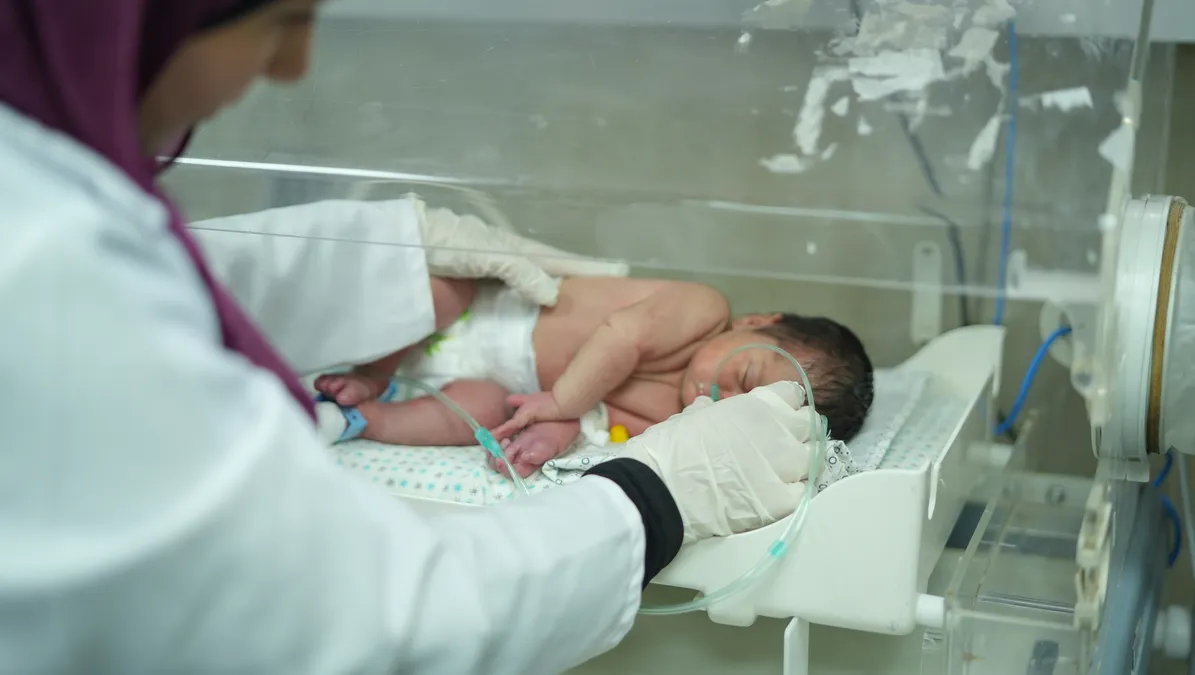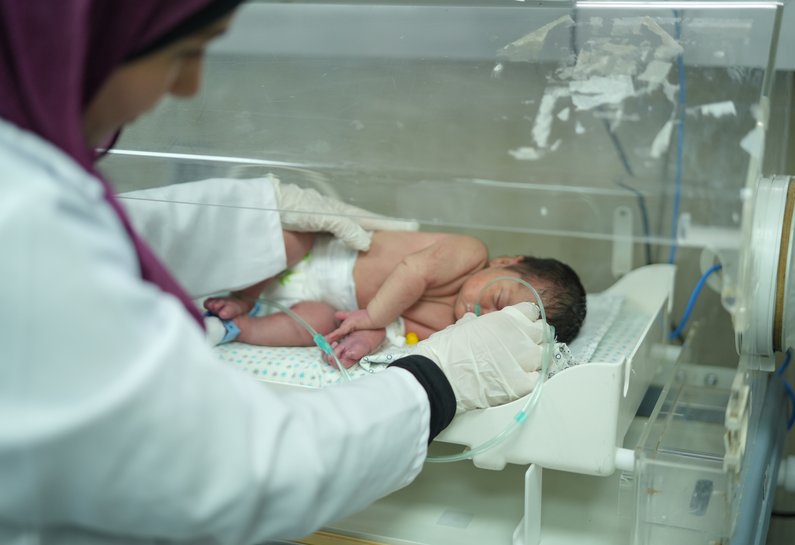Generation Palestine: Babies born under blockade in Gaza
30 August 2023


Huda’s baby Eman faces a future without freedom or dignity, trapped by Israel’s suffocating, 16-year illegal closure and blockade. Amid a collapsing economy, unemployment and poverty rates are sky-high, exposing children like Eman to food insecurity and the risk of chronic malnutrition.
With an eroding healthcare system, public health challenges such as limited access to safe drinking water, and life opportunities severely restricted by stringent controls on movement in and out of Gaza, it is little surprise that Gaza’s youngest generation have a life expectancy nearly nine years lower than for babies born in Israel.
More than two thirds of people in Gaza are also refugees, whose families were expelled from or fled from surrounding towns and villages during the Nakba (‘catastrophe’) 75 years ago, meaning that many of Gaza’s youngest residents are also born into a situation of perpetual displacement.
“I longed for a baby for many years,” Huda told me. “I became a first-time mother at the age of 39, giving birth to my baby Eman. I had a difficult pregnancy as I experienced a sudden increase in blood pressure, which posed a danger to my baby’s life.”
“Eman was born prematurely and weighed only three and a half pounds. Her immune system was weak, and she needed intensive care for 45 days. She developed a greater risk of retinopathy of prematurity (ROP), an eye disease that can cause blindness.”
“Eman was urgently admitted to a neonatal care unit, supported by MAP, at the Nasser Paediatric Hospital, where she was screened and underwent laser eye surgery. I’m very grateful that my baby is doing well now.”
In 2022, the neonatal mortality rate in Gaza was 7.9 deaths per 1,000 live births, according to data from MAP and the Palestinian Ministry of Health in Gaza, nearly three times the rate in Israel (2.7 per 1,000). Due to overcrowding and limited resources, families have to grapple with the challenges facing their newborns at their first breath in some hospitals in Gaza.
But amid the adversity, at MAP we have taken significant steps towards combatting some of these challenges head on. We have saved babies’ sight through ROP laser treatment that was not introduced prior to MAP's support. Our team has developed screening and treatment protocols, procured essential medicines and screening machines, as well as acquired state-of-the-art laser treatment equipment.
Perhaps the most painful part about this whole journey is that I don’t know the future of my baby girl. I don’t know if medical treatment will be available to her if she needs any in the future.
Moreover, we have conducted extensive training sessions for neonatal intensive care unit staff on ROP screening techniques and trained more than 705 healthcare providers including doctors, nurses and midwives who work at neonatal and obstetrics units. “The medical complications she [Eman] suffered from would have completely changed her life if it wasn’t for MAP’s support,” Huda told me.
However, gaps still exist as the health needs are huge. There are many issues facing babies born in Gaza including: a lack of medicines, disposables, equipment, infection prevention materials and skills of neonatal staff.
There is also a shortage of incubators and, with the high number of newborns, staff occasionally have no choice but to place more than one baby in an incubator. This can affect the health of newborns and raises the risks of infection and sepsis.
Today, there are 56 newborns in need of neonatal services at the Shifa Hospital, while only 41 incubators are available. In some cases, the heads of neonatal units at different hospitals coordinate to refer babies from one hospital to another where a vacant cot is available. However, today, all units are at their maximum capacity. Usually, there are 150 to 160 preterm admissions who stay between three days to three weeks each month, only at the Shifa hospital.
Moreover, transferring a newborn requires specialised transport incubators and places an additional burden on medical staff and the family involved. The cost of a single incubator is approximately £17,000.
“Perhaps the most painful part about this whole journey is that I don’t know the future of my baby girl. I don't know if she's going to live through another Nakba. I don’t know if medical treatment will be available to her if she needs any in the future,” Huda explained to me.
“She was born under siege and power outages; I don't know if she will ever see a life without siege and restrictions on freedom of movement and travel. She is less than one year old and already survived May’s military offensive on Gaza. Part of baby Eman’s life is already shaped by Israel’s occupation and blockade. She was born into a context of economic decline; I barely manage buying her milk and nappies every month.”
“I named her Eman, which means faith in Arabic, because I hope faith will offer her a decent life, different from the circumstances in which she was born, to grow up peacefully just like any other child around the world, to have dreams and achieve them and to be able to access medical care when needed. I have faith that with enough support, Eman will find joy in the smallest of things and will be happy by bonding with her family and community.”
Stay tuned for my second blog on the future facing babies in Gaza. In the meantime, please help us build the brighter future that Palestinians like Eman deserve by adding your voice to our Generation Palestine campaign today.
*Names changed to protect the identity of those involved.